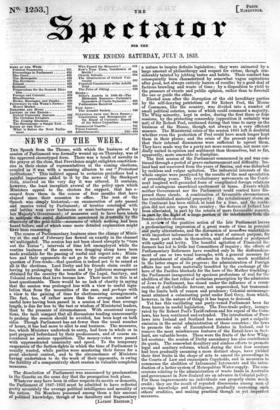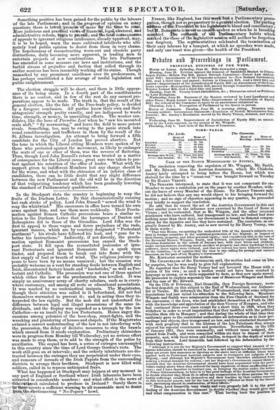The dissolution of Parliament was announced by proclamation in the
Gazette on the same day that the prorogation took place. Whatever may have been in other respects its merits or demerits, the Parliament of 1847-1852 must be admitted to have reflected pretty accurately the average political intelligence and morality of the nation. Its Members possessed among them a fair amount of political knowledge, though of too desultory and fragmentary
a nature to inspire definite legislation ; they were animated by a large amount of philanthropy and respect for virtue, though con- siderably tainted by jobbing tastes and habits. Their conduct has consequently been characterized by somewhat vague aspirations after good, not always entirely barren of results; by a deal of factious brawling and waste of time ; by a disposition to yield to the pressure of events and public opinion, rather than to forestall the one or guide the other.
Elected soon after the disruption of the old hereditary parties by the self-denying patriotism of Sir Robert Peel, the House of Commons, like the country, was divided into a number of small political coteries, none of which could command a majority. The Whig minority, kept in order, during the first three or four sessions, by the protecting censorship (opposition it certainly was not) of Sir Robert Peel, continued during that time to carry on the business of the House, though not always in a very efficient manner. The Ministerial crisis of the session 18.51 left it doubtful whether even the protection of Peel could have much longer kept them in their places ; and the crisis of the present year shows that their internal dissensions were sufficient to uproot them.
E• el have made way for a party not more numerous, not more cor-
_ y united in opinion and sentiment than themselves, but so far, apparently, more amenable to discipline.
The first session of the Parliament commenced in and was con- tinued through a period of grave embarrassment and difficulty. Ire- land had not recovered from the years of fimine, and was disturbed by reckless and vulgar agitation. The industrial interests of the whole empire were paralyzed by the results of the mad speculation of preceding years. The revolutionary movements on the Conti- nent inspired well-grounded fears of complicated foreign relations and of contagions anarchical excitement at home. -Events which neither Government nor the Parliament could control have ilia- persed these clouds. A combination of favourable circumstances has reestablished materiel prosperity.; the revolutionary storm on the Continent hais been stilled; at least for a time, and the conta- gion did not seize upon this country ; the distress of Ireland has been alleviated, in part by the return of more favourable seasons, laa-pnrt by the flight of a large portion of its inhabitants from the famine-stricken shores.
A review of the positive action of the late Parliament leaves a predominating impression of a great waste of time in personal and party.altercations, and the diseussion of measures undertaken with imperfect information or with a want of earnest purpose, for the most part crude in themselves, and abandoned or postponed with apathy and levity. The boastful agitation of Financial Re- formers has led to little but Committees of inquiry ; the efforts of Parliamentary Reformers have resulted only in the disfranchise- ment of one or two venal boroughs, with a general measure for the punishment of similar offenders in future, much mutilated in the latter stages of its progress ; the administration of Foreign affairs has not been materially benefited by the exchange of the hero of the Pacifico blockade for the hero of the Mather truckling; the Parliament inaugurated by specious professions of zeal for the abolition of the last relics of sectarian proscription by the admission of Jews to Parliament, has closed under the influence of a resur- rection of Anti-Catholic fervour, not unprovoked, but transcend- ing the limits both of reason and prudence ; Colonial mismanage- ment attained a culminating point under Earl Grey, from which, however, in the nature of things it has begun to descend.
Yet has this vacillating and party-vexed Parliament been far from barren in useful legislation. The Free-trade policy, inaugu- rated by Sir Robert P.cel's Tariff-reform and his repeal of the Corn- laws, has been continued and extended. The introduction of Poor- laws into Ireland and Scotland has amended in part a culpable omission in the social administration of those countries ; the laws to promote the sale of Encumbered Estates in Ireland, and to remove the most mischievous features of the Entail-laws in Scot- land, are valuable boons. These were the fruits of the four Whig- led sessions ; the session of Derby ascendancy has also contributed its quota. The somewhat desultory and aimless efforts to promote legal and sanitary reforms, which during the first four sessions had been gradually assuming a more distinct shape, have yielded their first fruits in the shape of acts to amend the proceedings in the Courts of Law and emancipate Copyholds, and in measures to commence the abolition of Intramural Interments and the intro- duction of a better system of Metropolitan Water-supply. The con- cessions relating to the administration of waste lands in Australia and government in New Zealand are an advance in Colonial policy. For these improvements-no individuals can properly claim much credit ; they are the result of repeated discussions among men of average knowledge and intelligence, gradually correcting each others' crudities, and making praotecal though as yet imperfect measures. Something positive has been gained for the public by the labours of the late Parliament; and in the progress of opinion on many questions there is latent premien -tot More for the time 'to come. More judicious and practital views of 'financial, legal, electoral, and administrative reform, begin to prevail; and the fatal consequences of appeals to ignorant religious intolerance, already -apparent, may, it is to be hoped, warn the more cultivated intellects who ulti- mately lead public opinion to desist from them in very shame. The hopelessness of reconstructing worn-out and obsolete party distinctions, daily becoming more apparent, is leading men to entertain projects of new combinations. The late Parliament has amended in some measure our laws and institutions, and the turbid stream of prejudice and faction that rolled through its earlier sessions has been insensibly working off its stains. Though unmarked by any prominent excellence over its predecessors, it has perhaps contributed a fair average of useful legislation and public enlightenment.



























 Previous page
Previous page